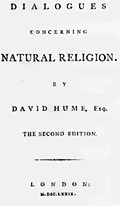David Hume, "Design Argument: Critique"
Philosophy of Religion
April 18 2024 15:31 EDT

David Hume
SITE SEARCH ENGINE
since 01.01.06
David Hume, "Design Argument: Critique"
Abstract: David Hume's version of the design argument from Dialogues Concerning Natural Religion is presented and his objections to that argument are summarized. Hume's analysis shows the disanalogy between the features of the universe and features of the purported Deity.
- Explain the meaning of the phrase, "as the cause ought only be proportioned to the effect…" Aren't the effects of causes often surprising? How do you think the notion of cause is related to scientific law?
- List the analogical respects, pointed out by Philo, between the characteristics of the world and the inferred characteristics of the Deity.
- David Hume (1711-1776) formulated a clear and succinct version of the
design argument.
-
- Hume cites the following objections to the design argument
quoted below in 2a.
- It
- Generally speaking, Hume's criticism is devastating for the design argument concluding in an anthropomorphic conception of God
- The main general objection given by Hume is as follows: “But as all perfection is entirely relative, we ought never to imagine, that we comprehend the attributes of this divine Being, or to suppose, that his perfections have any analogy or likeness to the perfections of a human creature.” Dialogues concerning Natural Religion (1779) in Dialogues and Natural History of Religion, ed. by J.A.C. Gaskin (Oxford: Oxford University Press, 1993), 44.
-
-
 Notes
are arranged in response to the
questions stated above in reference to chapter
"Critique
of the Design Argument" from Dialogues Concerning
Natural Religion by David Hume in Reading for Philosophical
Inquiry.
Notes
are arranged in response to the
questions stated above in reference to chapter
"Critique
of the Design Argument" from Dialogues Concerning
Natural Religion by David Hume in Reading for Philosophical
Inquiry.
- Explain the meaning of the phrase, "as the
cause ought only be proportioned to the effect…" Aren't
the effects of causes often surprising? How do you think the
notion of cause is related to scientific law?
- Hume assumes that similar effects result from similar causes.
- This assumption follows from straight-forward inductive reasoning: If we seen many events of kind E₁ followed by events of the kind E₂, then we conclude with some probability that events of kind E₁ cause or are constantly conjoined with events of the kind E₂.
- Events of kinds E₁ and E₂ are assumed to be ontologically similar—i.e., they are subject to normal conditions of experience.
- If Hume's notion of proportionality of cause and effect
were correct, laws involving different levels of phenomena
would not have meaning. I.e., consider the ideal
gas law.
- PV = nRT
- The ideal gas law states the Pressure of a gas multiplied times the Volume it occupies is equal to the number of moles of gas times the universal gas constant R and the Temperature Kelvin.
- An ideal gas is not “proportioned” to actual temperature, pressure, or volume.
- In general, causality is viewed by Hume as uniform constant conjunction or regularity of succession of events, and a scientific law is a statement of that regularity.
- List the analogical respects, pointed out by
Philo, between the characteristics of the world and the
inferred characteristics of the Deity.
- First, David Hume's interlocutor Cleanthes presents a clear and succinct
formulation of the design
argument:
- “Look round the world: contemplate the whole and every part of it: You will find it to be nothing but one great machine, subdivided into an infinite number of lesser machines, which again admit of subdivisions to a degree beyond what human senses and faculties can trace and explain. All these various machines, and even their most minute parts, are adjusted to each other with an accuracy which ravishes into admiration all men who have ever contemplated them. The curious adapting of means to ends, throughout all nature, resembles exactly, though it much exceeds, the productions of human contrivance; of human designs, thought, wisdom, and intelligence. Since, therefore, the effects resemble each other, we are led to infer, by all the rules of analogy, that the causes also resemble; and that the Author of Nature is somewhat similar to the mind of man, though possessed of much larger faculties, proportioned to the grandeur of the work which he has executed. By this argument é posteriori, and by this argument alone, do we prove at once the existence of a Deity, and his similarity to human mind and intelligence.”
- The analogical respects pointed out include the following:
- Just as designed machines are created by human beings, so
likewise the designed universe is made by a creator.
- adaptation of ends to means in a machine : human designer :: adaptation of ends to means in the world : world designer
- effect of the machine : caused by human maker :: effect of the universe : caused by universe maker
- Just as designed machines are created by human beings, so
likewise the designed universe is made by a creator.
- First, David Hume's interlocutor Cleanthes presents a clear and succinct
formulation of the design
argument:
- Explain the meaning of the phrase, "as the
cause ought only be proportioned to the effect…" Aren't
the effects of causes often surprising? How do you think the
notion of cause is related to scientific law?
- 3
- David Hume: The Design Argument: Short descriptions of five ojbections in Hume's classic criticism of the design argument from the Wikipedia encyclopedia.
- Design Argument: This entry in the Dictionary of the History of Ideas is historical summary of the argument from design by Frederick Ferré. Ancient, medieval, modern, and contemporary versions of the argument are described.
- Hume on Religion: 4. The Argument from Design. A section of an article from the Stanford Encyclopedia of Philosophy by Paul Russell thoroughly discussing the weakness of the analogical nature of the design argument for God's existence.
- Lecture #15: Critiques of the Design Argument: Robert Koons investigates why Hume bases his design argument on similarity which limits the conclusion to an anthropomorphic conception of God. Koons argues that if Hume's nominalism and anti-relationalism is rejected and analogical argument is viewed without a similarity requirement, Hume's agnostic conclusion can be avoided.
- Teleological Arguments for God's Existence: A thorough article from the Stanford Encyclopedia of Philosophy detailing a variety of design arguments including analogical, deductive, and (Peircean) abductive. Del Ratzsch relates the argument to contemporary issues and includes an excellent bibliography.
”[Hume's] reply to the teleological argument may appear conclusive. Yet some of the argument's proponets have responded that the existence of God is not implied merely by the order in the world but, as George Berkeley put it, by the ‘surprising magnificence, beauty , and perfection’ of that order. In other words, such a perfect world as ours could not be either the work of an inferior deity or the outcome of impersonal natural processes. Only an all-good, all-powerful, all-knowing creator could have produced such a flawless masterpiece.” Steven M. Cahn, Puzzles & Perplexities: Collected Essays (Lanham, MD: Lexington Books, 2007), 35.
Relay corrections, suggestions or questions to
larchie at lander.edu
Please see the
disclaimer
concerning this page.
This page last updated 01/27/24
© 2007 Licensed under the GFDL


